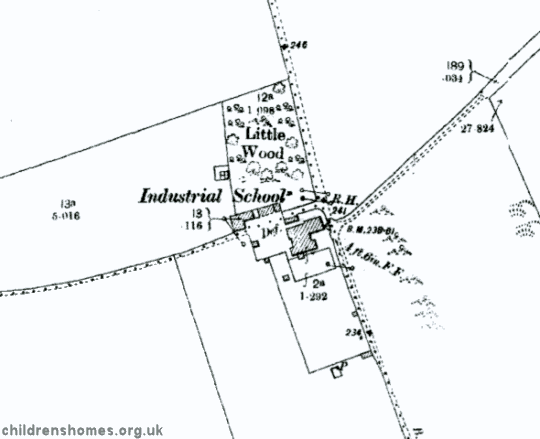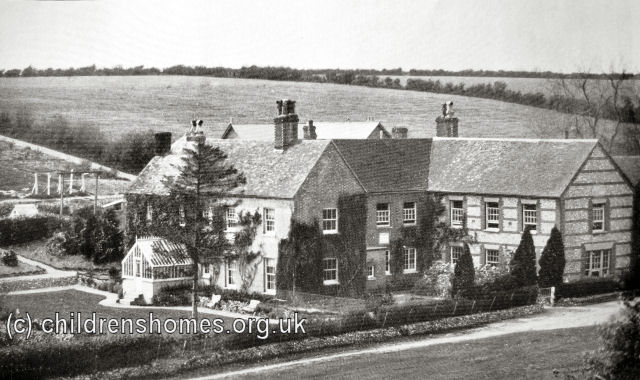Dorset Boys' Reformatory / Industrial School, Milborne St Andrew, near Blandford, Dorset
The Dorset Reformatory for Boys was founded in 1856 by the antiquary and philanthropist John Clavell Mansel (later Mansel-Pleydell) of Whatcombe, who himself paid for its premises at Milborne (sometimes spelled Milbourne) St Andrew, near Blandford Forum — the School was thus sometimes referred to as the Milborne Reformatory or the Blandford Reformatory. On January 28th, 1857, the establishment was officially certified to accommodate up to 20 boys, below the age of 16 at their date of admission, sentenced by the courts to a period of detention of up to five years. Additional buildings were added to the site, soon increasing its capacity was increased to 40. The School's first Superintendent was Mr John Stent, with Mrs Mary Stent as Matron. John Mansel acted as the overall manager of the establishment.
The School had its own farm on which the boys received training in agricultural and horticultural work. Because of its small size, however, many of the boys were employed on neighbouring farms. Some nautical training was also provided by means of two fully rigged masts set up in the grounds, and the School had its own band.
In 1880, following a drop-off in admission to the Reformatory, its management committee decided to convert the establishment to an Industrial School and bring it more under the control of the county authorities. The new Dorset County Industrial School for Boys, sometimes referred to as the Boys' Farm Home, officially came into operation on September 30th, 1881, certified to accommodate up to 60 inmates. At the same time, Mr John William Walker and his wife took over as Superintendent and Matron, with the first boys were admitted on October 4th, 1881.
The School site is shown on the 1902 map below.

Dorset County Industrial School site, Milborne, c.1920.
In its new guise, the school gradually extended the range of industrial training to include shoe-making, tailoring and carpentry, with poultry-keeping later added to the farming activities. The School's brass and reed band continued and provided some boys with a route into a career as military bandsmen. Recreations included football and cricket, with long walks and excursion arranged occasionally.
In 1900, it was reported that the boys had been carrying out a series of experiments for the County Council on the value of various manures.
In 1900, John Mansel-Pleydell offered to hand over the School, free of charge, to the Dorset County Council. It formally passed into Council ownership on January 1st, 1901. The School's founder died on May 3rd, 1902.

Dorset Reformatory for Boys, Milborne, from the south-east, c.1900. © Peter Higginbotham
The School was closed on August 31st, 1920. Mr and Mrs Walker remained in post as Superintendent and Matron for the whole of that time, eventually retiring after 39 years' service.
The property is now home to a charitably run community farm known as Longmead.
Records
Note: many repositories impose a closure period of up to 100 years for records identifying individuals. Before travelling a long distance, always check that the records you want to consult will be available.
- Dorset History Centre, Bridport Road, Dorchester DT1 1RP. Holdings: Annual Reports (1857-1863); Pamphlet describing work of the School (1900), Letters from ex-pupils (1898-1900); Correspondence on transfer of school to Dorset County Council (1900-1901).
Census
Bibliography
- Carpenter, Mary Reformatory Schools, for the Children of the Perishing and Dangerous Classes, and for Juvenile Offenders (1851, General Books; various reprints available)
- Carlebach, Julius Caring for Children in Trouble (1970, Routledge & Kegan Paul)
- Higginbotham, Peter Children's Homes: A History of Institutional Care for Britain's Young (2017, Pen & Sword)
- Abel Smith, Doroth Crouchfield: A History of the Herts Training School 1857-1982 (2008, Able Publishing)
- Garnett, Emmeline Juvenile offenders in Victorian Lancashire: W J Garnnett and the Bleasdale Reformatory (2008, Regional Heritage Centre, Lancaster University)
- Hicks, J.D. The Yorkshire Catholic Reformatory, Market Weighton (1996, East Yorkshire Local History Society)
- Slocombe, Ivor Wiltshire Reformatory for Boys, Warminster, 1856-1924 (2005, Hobnob Press)
- Duckworth, J.S. The Hardwicke Reformatory School, Gloucestershire (in Transactions of the Bristol and Gloucestershire Archaeological Society, 1995, Vol. 113, 151-165)
- Higginbotham, Peter Children's Homes: A History of Institutional Care for Britain's Young (2017, Pen & Sword)
- Mahood, Linda Policing Gender, Class and Family: Britain, 1850-1940 (1995, Univeristy of Alberta Press)
- Prahms, Wendy Newcastle Ragged and Industrial School (2006, The History Press)
Links
- Longmead Community Farm
- Red Lodge Museum, Bristol — a former girls' reformatory.
Except where indicated, this page () © Peter Higginbotham. Contents may not be reproduced without permission.


